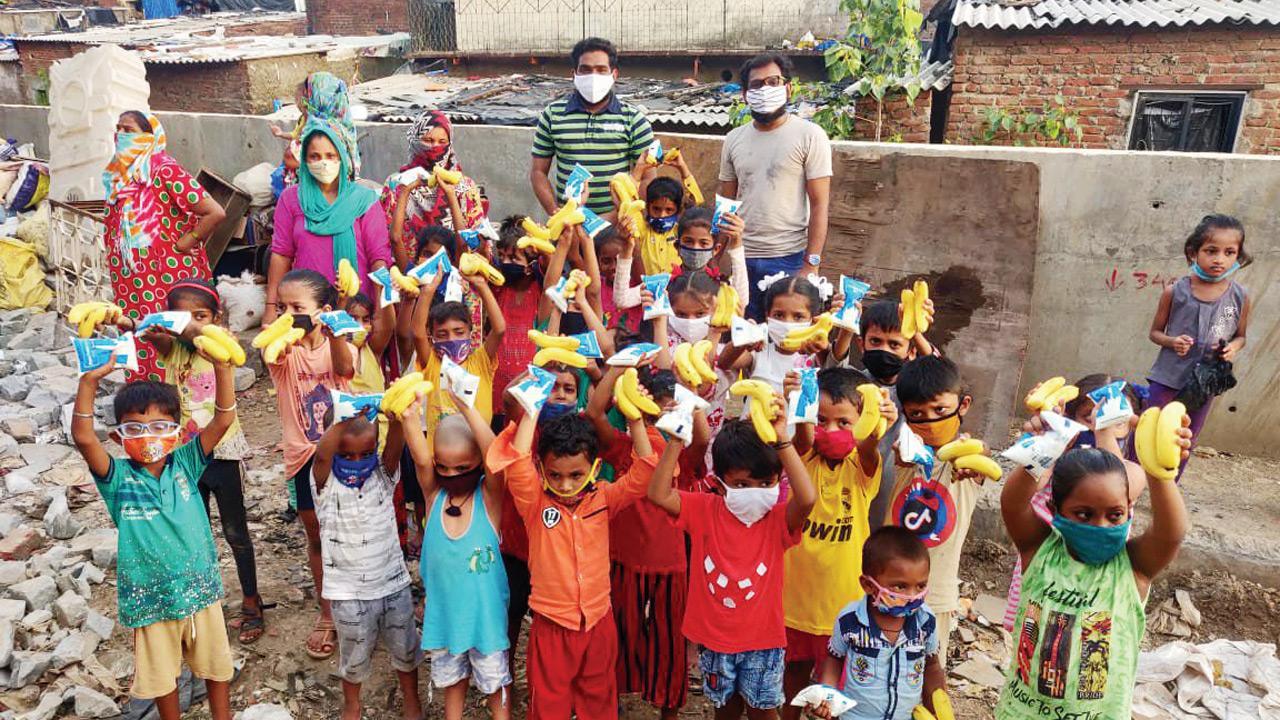Underprivileged children, who have taken a hard hit during the pandemic-induced lockdown with depleting food resources in homes, are the new focus of non-profits

The supplementary nutrition programme launched by Hope is supporting 1,500 children in Govandi, Bhagat Singh Nagar, Malwan and Gorai
Will children be infected the most during the third wave of Covid-19? While we may not have conclusive answers to that yet, there’s enough evidence to show how kids, especially among vulnerable groups, are already paying a heavy price in the pandemic. Disrupted livelihoods of workers in the informal sector and indefinite school closures have led to the interruption of nutrition programmes. According to the India Child Well-being Report released last year by the World Vision India, an NGO that works towards helping underprivileged children, the pandemic and the resultant lockdowns have put almost 115 million children at the risk of malnutrition.
ADVERTISEMENT
The happiness kit by Akshaya Patra Foundation containing pulses, spices, peanuts, jaggery and biscuits
Filmmakers Chhitra Subramaniam and Surya Balakrishnan have founded an outreach initiative called HOPE, through which they are focusing on nutrition for underprivileged children. The programme is running in five communities currently. “The volunteers on ground are people who are residents of the bastis, whom we have worked with since the beginning of the pandemic last year. We know them well and chose to make them stakeholders because no one cares for the kids there as much as they do. Moreover, no one can run our programme on the ground better than them,” says Subramaniam. Each child is given two eggs per day, and two bananas and milk the following day. The programme, which is currently in its eighth week, is supporting 1,500 children with supplementary nutrition. “After losing their jobs and then their savings in the current round of the lockdown, families don’t even have money for basic grub, forget nutritious food for their children,” says Balakrishnan. Poor living conditions, where large families live in tiny tenements in unhygienic surroundings, with no scope for social distancing, makes them more susceptible to the virus. Until now, they have reached out to 230 kids in Govandi’s Shivaji Nagar, 205 children in Bhagat Singh Nagar, Goregaon, 965 in Malwan and 100 more in Gorai.
Akshaya Patra Foundation, a not-for-profit organisation headquartered in Bengaluru, has designed “happiness kits” for their beneficiaries. With school closures depriving children of education and mid-day meals, the organisation is providing pulses, spices, peanuts, jaggery, biscuits and other food items to enhance children’s nutritional intake, above and beyond the allocated grains by the central and state governments. Each kit has a nutritional value of 717.5 gm of protein and 22,175 calories of energy, while on a per meal basis, each child receives 23.9 gm of protein and 739 calories of energy. The kit also includes soap, a toothbrush, toothpaste, sanitary pads to promote children’s hygiene. Activity-based learning workbooks in regional languages are also included in the kit to ensure that their learning continues in these difficult times.
FFoundation for Mother and Child Health (FMCH), a Mumbai-based organisation, is ensuring that communities have information and access to make the right food choice in low resourced settings. This is done by providing accurate, actionable knowledge and other associated intensive services to families. “Since the pandemic, it has been difficult to conduct anthropometry [a systematic measurement of the physical properties of the human body] for children in a safe and socially distanced manner because there is no space in slum areas. Therefore, it’s harder to give exact number of children who are malnourished in the communities, but we have noticed that malnourishment cases have gone up. The early signs were the drop in diet diversity. For example, earlier, families would have at least five to seven food groups. In the pandemic, this was reduced by 50 per cent,” says FMCH CEO Shruthi Iyer.
Chhitra Subramaniam and Surya Balakrishnan, founders of Hope
FMCH is currently working in Kurla and Bhiwandi, with pregnant women and children up to two years of age. Their projects focus on encouraging preventive health, balanced nutrition and child developmental practices during the 1,000 days of life. A study conducted by the NGO last year showed that 64 per cent families are facing financial complications, 40 per cent families stated an emotional shift towards stress and anxiety in the house, thereby affecting their mental health and 39 per cent families have food insecurities, which has led to major impact on health and nutrition. The most-affected target groups in these communities, says Iyer, are pregnant mothers who have limited access to health services for their ante-natal check-ups and hospital delivery. “Food choices make a huge difference in these circumstances. For instance, if you have Rs 20, you’ll find so many people choosing to buy a pack of chips. But if you buy two eggs or three bananas with the same money, you are making a healthier food choice. We are guiding them with that.”
For the founders of Hope, the challenge now is to sustain the programme. “We are seeing a positive change in the children in terms of their health. Their weight has increased. But, for their immunity to be built up to desired levels, the programme must run for at least six months, if not more. We need funding to sustain this.”
 Subscribe today by clicking the link and stay updated with the latest news!" Click here!
Subscribe today by clicking the link and stay updated with the latest news!" Click here!






